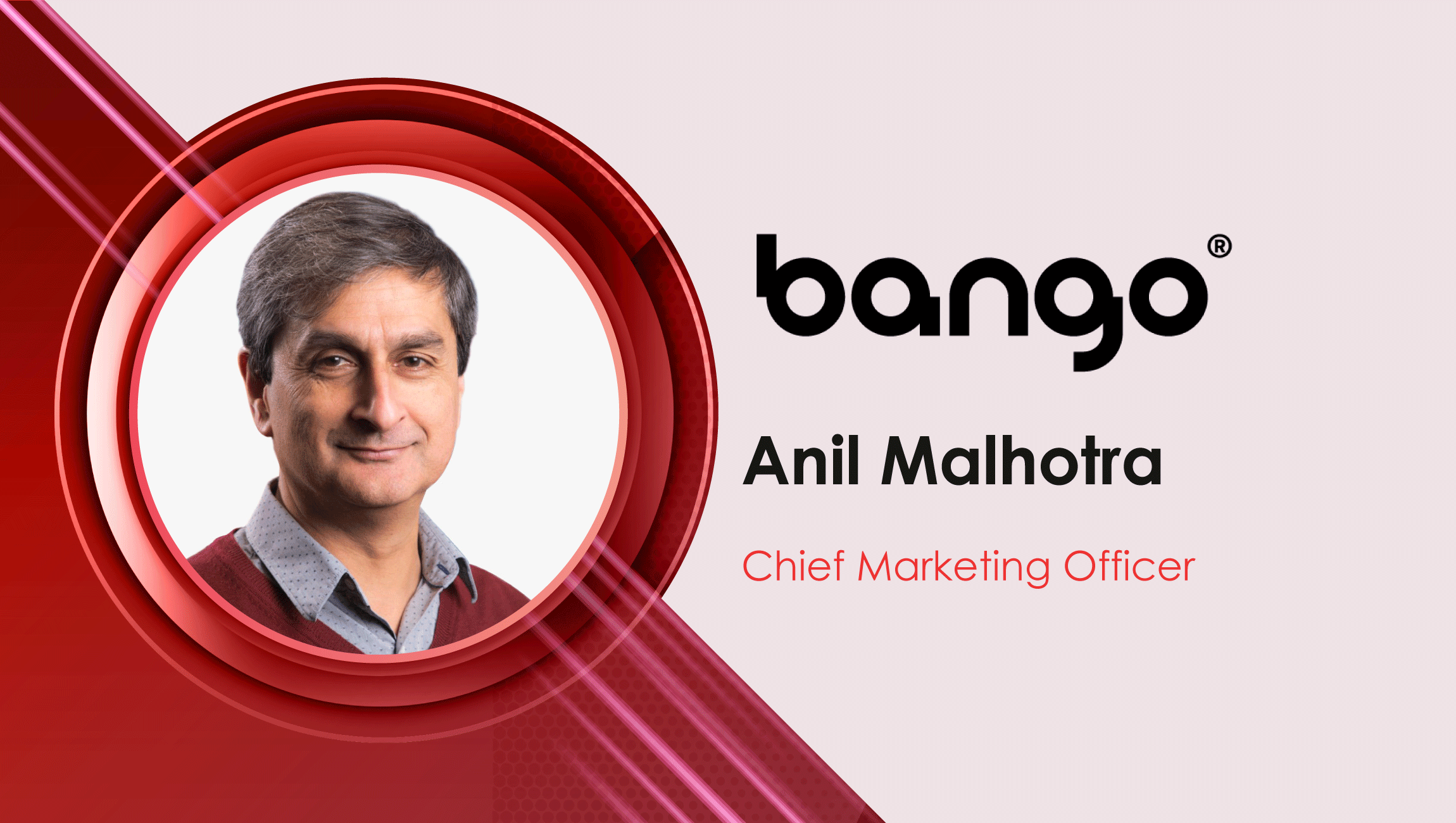Anil Malhotra, Chief Marketing Officer at Bango talks about avoiding wasteful spends in digital advertising and what modern advertisers could do better to build effective online engagement:
___________
Welcome to this MarTech Series chat, Anil, tell us about yourself and your role as CMO at Bango…
As CMO, I work to promote the adoption of Bango’s technology and, in doing so, to challenge the conventional metrics of marketing success. I’m a big believer in the view that digital marketing — and specifically ad targeting — is broken.
To fix it, we need to push for a stronger connection between the marketing investments a business makes and the revenue it generates, rather than relying solely on abstract “engagement” metrics. This is what Bango is all about.
In terms of how I spend my time, in addition to supporting our product marketing teams, I mainly focus on promoting the Bango story and anticipating future market trends and their significance. I’m constantly asking how these trends will impact our customers, partners, and investors. This means meeting with marketers, technologists, and influencers who champion the same ideas, using these insights to shape my strategic vision for both Bango and the wider digital advertising space.
Marketing Technology News: MarTech Interview with Alexander Bachmann, CEO of Mitgo
We’d love to hear more about Bango’s latest innovations and how it’s filling various lags for marketers and end users in associated business functions?
Bango’s latest innovation, Bango Audiences, addresses a significant issue in digital advertising — poor targeting that leads to hugely wasteful spending. Conventional ad targeting relies heavily on guesswork, resulting in a high percentage of digital ads reaching the wrong audience. In fact, our research has shown that over a third of traditional search ads (35%) fail to reach their intended audiences, while more than a quarter fail to reach those with any purchase intent whatsoever. This is money down the drain.
Bango Audiences changes our thinking about targeting, distributing ads to people not based on what they search for or share on social media, but based on what they buy. This innovative approach to customer segmentation is what we call “purchase behavior targeting”, calling on anonymized buying behavior data from hundreds of millions of users around the web.
By targeting only users who pay for similar goods, Bango Audiences can double the conversion of online ads to new paying customers, delivering a far higher return on ad spend (ROAS) for marketers, advertisers and, increasingly, retail brands. All of this is achieved in a privacy conscious way without the need for cookies, IDFA or invasive tracking.
Given the insights from Bango’s platform and your various studies in the recent months surrounding customer spend behaviors, what key highlights would you like to share here, pointers from these studies that marketers should especially keep in mind?
Over the years Bango has produced a lot of studies looking at how digital advertising is failing marketers. We’ve uncovered that billions of dollars in ad revenue are wasted each year, that digital metrics are often meaningless. Moreover, business leadership is running out of patience with digital marketing. In short, the industry’s broken and it needs a change.
But it’s not enough to just point out these problems, we want to help fix them. Working with some of the industry’s biggest names — from Bob Hoffman to Rory Sutherland — we’ve developed a new manifesto for digital marketing, identifying the problems but also offering solutions.
Key among these is a need to avoid stereotypes and ‘data gluttony’. As marketers there’s a tendency to hoard data, collecting personal information, for example about race, age or gender, that simply isn’t required.
By focusing purely on behavioral data, like purchase patterns, we can avoid that.
Instead of building up a personal profile for customers, purchase data allows you to develop a consumer profile, purely collecting data on what they buy rather than profiling who they are. That’s not only less intrusive, it’s also more effective.
Measurement is another area that I believe needs reform. Bango’s latest study shows that 62% of CEOs believe their marketing budgets are wasted on activities that don’t deliver meaningful results. Digital advertising needs to stop hiding behind likes and clicks and focus on adding real business value.
These are all things that our industry experts have helped to address in the manifesto. Now it’s live we’re hoping more and more marketers will sign up and commit to these ambitions in their own professional careers.
Take us through some of the B2B tech and martech trends that you feel will dominate the rest of 2023?
To me, there are really four significant trends that will dominate martech for the rest of 2023:
- Transformation of social media advertising
Social media advertising has faced substantial challenges, with many users reporting overexposure to irrelevant ads. This issue, combined with data showing a growing skepticism among CEOs about the effectiveness of social media spend, suggests a need for reevaluation.
In the year ahead, I’m expecting to see marketers rethinking their social ad strategy, investing in better ways to make authentic connections with their audiences. This will be driven by changing budgets and targets, as economic pressures force digital marketers to demonstrate the business value of their work.
- More Meaningful Metrics
Many current social media metrics have been shown to be meaningless, failing to correlate with revenue, growth or conversions.
In line with the above, marketers need to shift their focus to metrics that accurately reflect business impact. In 2023, I’m hoping to see the end of superficial engagement measures such as likes and retweets in exchange for advertising metrics that actually matter to the bottom line, especially conversion from ads to sales.
- Reevaluating Search Advertising:
Search was traditionally seen as a safe bet for the digital advertising world, but now many are starting to question its impact. With poor targeting concerns surrounding the biggest search engines and younger internet users refocusing on video content, I expect to see a lot of marketers revaluating their use of search-based targeting.
At the same time, advertisers are also realizing the weak link between what people search for and their actual purchase intent. This isn’t to say that search engines have no place in the future of advertising, but simplistic search-based targeting needs to be replaced by better thought through targeted ad placement.
Marketing Technology News: Missing the Moment: Pitfalls of Over Reliance on Campaign and Product-Driven Marketing
- A higher standard of targeting
There’s a clear need for more precise and relevant targeting methods. Marketers have been overly reliant on outdated tracking methods and irrelevant data, leading to ineffective digital ads. I’m optimistic that over the next year we should see a widespread move towards using more meaningful and reliable data to target ads.
I believe that purchase behavior targeting is at the forefront of this trend. By directing ads toward the users most likely to buy (based on what they’ve already purchased), we can create more relevant, personal advertising that is effective without being creepy or invasive. As more and more advertisers start to adopt this type of targeting we can expect to see the effectiveness of digital advertising improve across the board.

The world’s largest online merchants, including Amazon, Google and Microsoft, use Bango technology to acquire more paying users. Bango has developed unique purchase behavior technology that enables millions more users to buy the products and services they want, using innovative methods of payment including carrier billing, digital wallets and subscription bundling.
Anil Malhotra is Chief Marketing Officer at Bango
Missed The Latest Episode of The SalesStar Podcast? Have a quick listen here!
Episode 178: RevOps and Revenue Generation Best Practices with Derrick Herbst, Director-Business Transformation at Conga
Episode 177: Marketing Automation and Marketing Ops Tips with Raja Walia Founder and CEO of GNW Consulting
Episode 176: B2B Marketing Tips with Inbar Yagur, Director of Content and Product Marketing at Lusha











